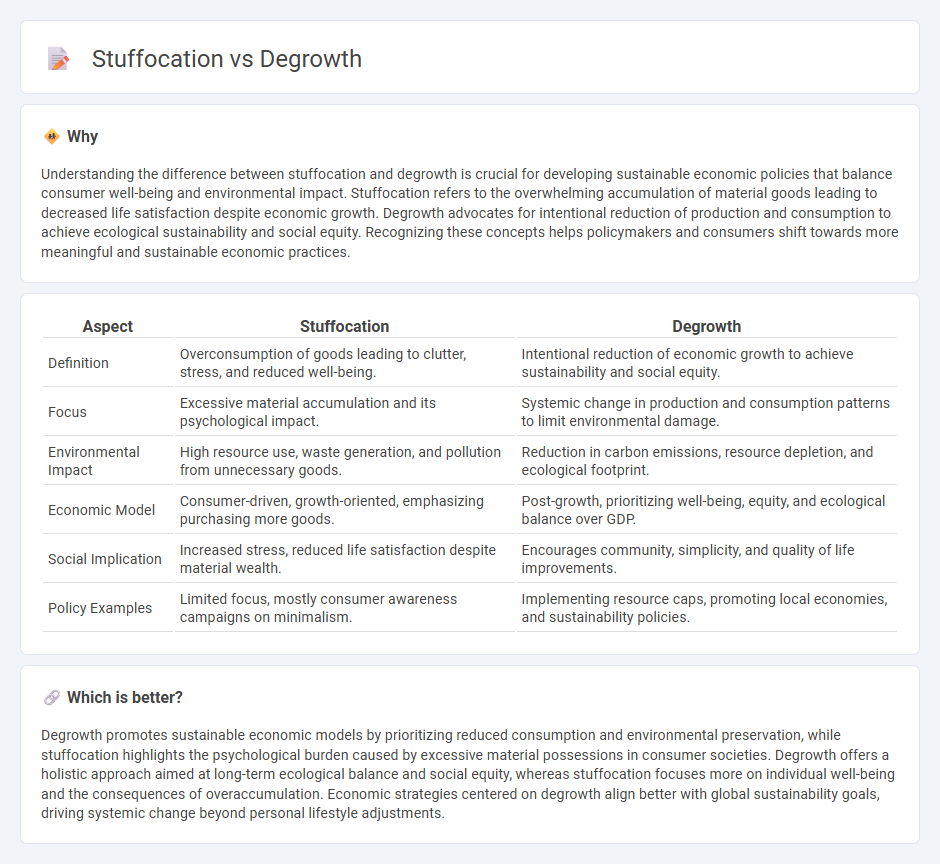
Stuffocation describes the rising dissatisfaction despite increasing material wealth, highlighting consumerism's limits in improving well-being. Degrowth proposes a deliberate reduction in production and consumption to create a sustainable economy focused on quality of life rather than GDP expansion. Learn more about how these concepts challenge traditional economic growth models and shape future policy debates.
Why it is important
Understanding the difference between stuffocation and degrowth is crucial for developing sustainable economic policies that balance consumer well-being and environmental impact. Stuffocation refers to the overwhelming accumulation of material goods leading to decreased life satisfaction despite economic growth. Degrowth advocates for intentional reduction of production and consumption to achieve ecological sustainability and social equity. Recognizing these concepts helps policymakers and consumers shift towards more meaningful and sustainable economic practices.
Comparison Table
| Aspect | Stuffocation | Degrowth |
|---|---|---|
| Definition | Overconsumption of goods leading to clutter, stress, and reduced well-being. | Intentional reduction of economic growth to achieve sustainability and social equity. |
| Focus | Excessive material accumulation and its psychological impact. | Systemic change in production and consumption patterns to limit environmental damage. |
| Environmental Impact | High resource use, waste generation, and pollution from unnecessary goods. | Reduction in carbon emissions, resource depletion, and ecological footprint. |
| Economic Model | Consumer-driven, growth-oriented, emphasizing purchasing more goods. | Post-growth, prioritizing well-being, equity, and ecological balance over GDP. |
| Social Implication | Increased stress, reduced life satisfaction despite material wealth. | Encourages community, simplicity, and quality of life improvements. |
| Policy Examples | Limited focus, mostly consumer awareness campaigns on minimalism. | Implementing resource caps, promoting local economies, and sustainability policies. |
Which is better?
Degrowth promotes sustainable economic models by prioritizing reduced consumption and environmental preservation, while stuffocation highlights the psychological burden caused by excessive material possessions in consumer societies. Degrowth offers a holistic approach aimed at long-term ecological balance and social equity, whereas stuffocation focuses more on individual well-being and the consequences of overaccumulation. Economic strategies centered on degrowth align better with global sustainability goals, driving systemic change beyond personal lifestyle adjustments.
Connection
Stuffocation describes consumer frustration caused by excessive material possessions, which aligns with the degrowth economic model emphasizing reduced consumption and sustainable resource use. Degrowth challenges the traditional growth-driven economy by promoting minimalism and prioritizing ecological balance over mass production and accumulation of goods. Both concepts highlight the negative consequences of overconsumption on well-being and environmental sustainability.
Key Terms
Overconsumption
Overconsumption drives both degrowth and stuffocation, emphasizing the environmental and social strains of excessive consumption patterns. Degrowth advocates for reducing production and consumption to achieve ecological balance, while stuffocation critiques the overwhelming accumulation of material goods that harms well-being. Explore how shifting consumption habits can address these intertwined challenges.
Sustainable Development
Degrowth emphasizes intentional downscaling of production and consumption to achieve ecological sustainability and social equity, contrasting with stuffocation, which highlights the stress caused by excessive material possessions and consumer overload in developed societies. Sustainable development integrates these concepts by promoting resource efficiency, reducing environmental impact, and fostering well-being without overconsumption. Explore how these frameworks reshape economic models towards long-term planetary health and social prosperity.
Well-being
Degrowth emphasizes reducing production and consumption to achieve sustainability, prioritizing human well-being over economic growth. Stuffocation describes the negative impact of overconsumption and material excess on mental health and life satisfaction. Explore more about how degrowth strategies can combat stuffocation and enhance overall well-being.
Source and External Links
Degrowth - Wikipedia - Degrowth is an economic and social movement that advocates reducing the material size of global economies to address ecological overshoot, resource depletion, and inequality by prioritizing well-being, public services, and sustainability over growth at all costs.
Essential for degrowth - Degrowth critiques capitalism's pursuit of endless growth, links systems of domination like colonialism and patriarchy to environmental destruction, and calls for a radical redistribution of power, wealth, and resources to achieve social and ecological justice within planetary boundaries.
Degrowth: what's behind this economic theory and why it matters today - Degrowth is a radical economic theory proposing the deliberate shrinking of economies to reduce resource and energy use, with a focus on well-being rather than profit, and practical actions like consuming less and reusing existing resources.
 dowidth.com
dowidth.com